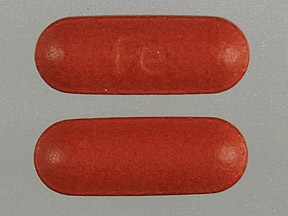
What is Carbonyl iron?
Carbonyl Iron is a product that replaces iron. Iron is normally obtained from food. Iron is essential for the production of red blood cells, which carry oxygen to your tissues and organs. Use carbonyl iron to treat or prevent iron deficiencies and iron-deficiency anaemia. This medication guide does not list all possible uses of carbonyl iron.
Side effects of carbonyl iron
If you experience any of the following signs and symptoms of an allergic reaction: difficulty breathing, hives or swelling to your face, lips or throat - seek medical assistance immediately!
Side effects of carbonyl iron include:
- Diarrhoea, constipation;
- Nausea, vomiting, and stomach pain;
- Tooth discoloration;
- Dark-coloured bowel motions
There may be other side effects. Call your doctor immediately if experiencing side effects; or contact the FDA's hotline at 1-800-FDA-1088 if reporting them directly.
Warnings
Keep carbonyl-iron out of reach of children. A child can die from an accidental overdose of carbonyl iron.
Similar/related drugs
Ferrous sulphate, Venofer, erosul, and Infed
Before you take this drug
If you are allergic or have any of the following:
- A stomach ulcer, or colitis ulcerative
- Hemochromatosis;
- Hemolyticanemia
- Anaemia is not caused by iron deficiencies.
You should ask your doctor or pharmacist whether it is safe to take this medication if you don't have an iron shortage. People with a normal iron level should not use carbonyl iron.
A carbonyl iron tablet may contain milk. Tell your doctor about lactose sensitivity or a milk allergy. You may need a different dose during pregnancy or breastfeeding. You may need a different dose during pregnancy or breastfeeding. Do not administer this medicine to children younger than 12.
How to take carbonyl iron?
Do not exceed the recommended dosage or duration. Use the recommended dose and do not exceed it. If you have a stomach upset, carbonyl iron can be taken with food.
Chew the chewable tablet before swallowing it. Just before measuring a dose, shake the oral suspension well. Use the provided dosing syringe or a dose-measuring cup or spoon to measure liquid medicine. Consult with your pharmacist if you don't own a device to accurately measure doses.
Tell your carers if you require a transfusion that you use carbonyl iron. Take carbonyl iron only for a maximum of 6 months, unless your doctor has advised you to do so. Store away from heat and moisture at room temperature. Store this medicine away from children. A child's accidental iron overdose can be fatal.
Details on dosage
Adult dose for iron deficiency anaemia:
Take 50 mg three times per day.
The usual dose for iron deficiency anaemia in children is:
Premature neonates:
Divided every 12–24 hours, 2–4 mg of elemental iron per kg (maximum dose daily = 15 mg)
Infants and children aged 12:
Prophylaxis: Maximum 15 mg/kg/day of elemental iron in divided doses between 1 and 2 mg/kg/day.
Iron deficiency:
3 mg of elemental iron per kg/day, divided into 1 or 2 doses.
Severe iron deficiency anaemia
In 3 divided doses, 4 to 6 mg of elemental iron/kg/day
What happens if I miss the dose?
As soon as you recall, take the missed dose. If it is close to the time for the next dose, you can skip the missed dose and take the regular dose. Do not take two doses.
What happens if I overdose?
Call the Poison Help Line at 1-800-222-1222 or seek emergency medical care. A carbonyl-iron overdose can be deadly, especially for children. Overdose symptoms include nausea, diarrhoea, bleeding or tarry stool, fever, and severe stomach pain. Other symptoms are pale skin, blue fingernails or lips, a rapid but weak pulse, shallow breathing, or seizures.
What should be avoided?
Carbonyl iron should not be taken within 2 hours of other medications. Carbonyl iron can interfere with the absorption of other medications.
Interaction with other drug
If you also take any of these drugs, ask your doctor or pharmacist whether it's safe to use carbonyl.
- An antacid;
- An antibiotic, such as ciprofloxacin or levofloxacin; doxycycline or tetracycline.
- A stomach acid reducer, such as cimetidine, Tagamet (Pepcid), famotidine, or Ranitidine (Zantac),
This list is incomplete. There are other drugs that may interact with carbonyl iron, such as prescription and over-the-counter medicines, vitamins, and herbal products. This medication guide does not list all possible interactions.



